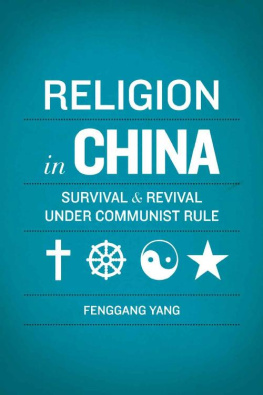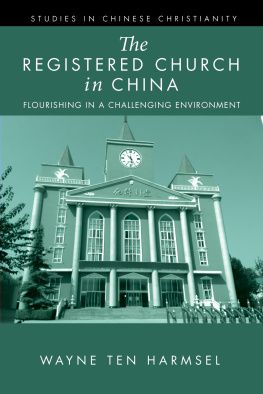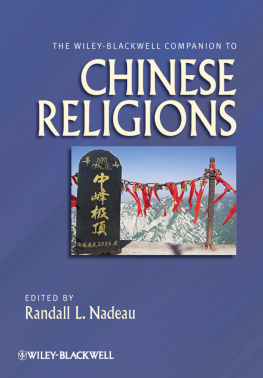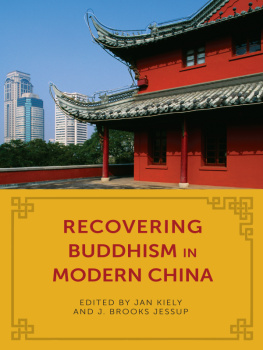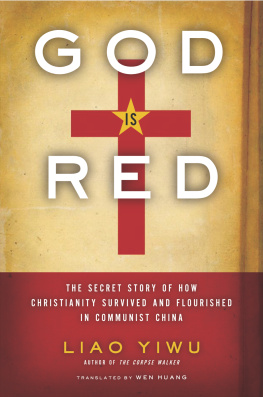RELIGION IN CHINA
RELIGION IN CHINA
Survival and Revival under
Communist Rule
FENGGANG YANG


Oxford University Press, Inc., publishes works that further
Oxford Universitys objective of excellence
in research, scholarship, and education.
Oxford New York
Auckland Cape Town Dar es Salaam Hong Kong Karachi
Kuala Lumpur Madrid Melbourne Mexico City Nairobi
New Delhi Shanghai Taipei Toronto
With offices in
Argentina Austria Brazil Chile Czech Republic France Greece
Guatemala Hungary Italy Japan Poland Portugal Singapore
South Korea Switzerland Thailand Turkey Ukraine Vietnam
Copyright 2012 by Oxford University Press, Inc.
Published by Oxford University Press, Inc.
198 Madison Avenue, New York, New York 10016
www.oup.com
Oxford is a registered trademark of Oxford University Press
All rights reserved. No part of this publication may be reproduced,
stored in a retrieval system, or transmitted, in any form or by any means,
electronic, mechanical, photocopying, recording, or otherwise,
without the prior permission of Oxford University Press.
Library of Congress Cataloging-in-Publication Data
Yang, Fenggang.
Religion in China : survival and revival under communist rule / Fenggang Yang.
p. cm.
ISBN 978-0-19-973564-8
ISBN 978-0-19-973565-5
1. ChinaReligion20th century. 2. Communism and religionChina
History20th century. 3. ChinaReligion21st century. 4. Communism
and religionChinaHistory21st century. I. Title.
BL1803.Y34 2011
200.95109045dc22 2011010628
1 3 5 7 9 8 6 4 2
Printed in the United States of America
on acid-free paper
This book is dedicated to my father,
Yang Liansheng (19242009),
a lifelong Chinese Communist Party member
who was baptized into Christ on his deathbed upon
his request
PREFACE
This book has taken about a decade to complete from its initial conception to its current form. I began to conduct systematic empirical research on religion in China in 2000. The original plan was focusing on Christian ethics in the market transition, a project that draws theoretical reference from Max Weber, one of the founding fathers of sociology. If the Protestant ethic, as Weber argues, was conducive to the emergence of modern capitalism in the West, would there be some Chinese Protestant ethic, and would it be conducive to the transition toward a market economy in China? However, during the process of collecting fieldwork and interview data in eight cities throughout China, I was frequently puzzled by various religious phenomena burning for understanding and explanation. To sum it up in one large question: How could religion survive and revive in China under Communist rule? Without answering this prime question first, I felt it impossible to move further to examine religion as a causal factor or an independent variable in the process of social change within contemporary China.
THE PREPARATION
To tackle this basic question about religion in China is not an easy undertaking for a person like myself, who was born and raised in China when religion was very much absent from the schools and the larger society. At school, if there was anything we learned about religion, it was that religion was the opium of the people; only the oppressed and the weak would resort to superstitious religious beliefs. In the rural community in northern China where I grew up, religion was not part of village life. The only remotely religious things in my childhood that I can now recall are a few ghost stories told by the old villagers during long, dark, and boring nights and an occasion of Daoist ritualists performing at a funeral. Upon hearing such stories or seeing such rituals, people, at least my peers, would simply laugh them off. We were taught at school that we must establish a scientific outlook on life (jianli kexue de rensheng guan); it was believed that only science and technology and Mao Zedong Thought would make society progress toward the future beautiful Communist Society.
My personal experience of growing up in China is not an exception. An American visitor observed during his trip to China in 1972: During our visit we saw almost no evidence of surviving religious practice.We saw no functioning Buddhist temples. Some of those we visited had been converted to use as tea houses, hostels or assembly halls; others were maintained as museums. Some Chinese with whom we talked were curious about religion. They were amazed to learn that educated persons in the West continue to believe and practice religion. For them, they said, the study of scientific materialism had exposed the logical fallacies and absurdities of religion.
From kindergarten to college, the absence of religion in school lasted well into the 1980s. Many years after that, religion was still absent in most communities, even though, beginning in 1979, a limited number of temples, churches, and mosques were allowed to reopen for religious services. Moreover, even if there was a church or temple in a neighborhood, most of the local residents might not be aware of its presence. During my 2000 field research in several cities in China, I asked several times for directions to a nearby church or temple, but people in the street simply had no clue that there was a church or temple in the neighborhood, even though the church or temple was within a hundred meters from where we were standing.
After entering graduate school in 1984, while studying Western philosophy, somehow I became fascinated with Hegels Absolute Spirit, Kants ideal of pure reason and postulate of practical reason, and the concepts of God and religion in general. In my masters thesis, On the Evolution of the Notion of God in Western Philosophy, I examined the arguments by major philosophers from ancient Greece until modern times. After receiving my masters degree in Western philosophy, I took a job in religious studies in the philosophy department of Renmin University of China in Beijing. That was in 1987, when both religion and the study of religion were recovering from elimination during the Cultural Revolution (19661976). To my surprise, in the Introduction to the Study of Religion (Zongjiao Xue Gailun) course, which I taught for a semester, about 120 students from various departments were enrolled. Besides the curious and enthusiastic students, I also encountered devout believers at tourist or religious sites. Such phenomena of living religion eventually led me to pursue a doctorate in the sociology of religion.
Through a series of fortuitous opportunities, or by divine providence, as one may say, I arrived at the Catholic University of America in Washington, D.C., in early 1989 and in fall began my PhD studies under the guidance of the well-known sociologist of religion Dean R. Hoge. Since 2002, I have been teaching Religion in America to Purdue undergraduates on a regular basis. Through all of these learning and research experiences, I have gained knowledge regarding both the various religions and the sociological theories of religion, which has prepared me to tackle the basic and general questions of religion in China.
THE SCOPE AND ORGANIZATION
OF THIS BOOK
The rapid social changes in Chinese society have attracted many scholars to conduct original research, but until recently, religious change has been very much neglected by social scientists both inside and outside China. This negligence may have historical and intellectual reasons. Since the May Fourth and New Culture movements around 1919, Chinese elite intellectuals, influenced by European Enlightenment discourses, have become critical of and despising toward religion. The received wisdom has been that the Chinese as a whole have never been religious. Hu Shih, one of the most influential Chinese intellectuals in the twentieth century, states, China is a country without religion and the Chinese are a people who are not bound by religious superstitions.

